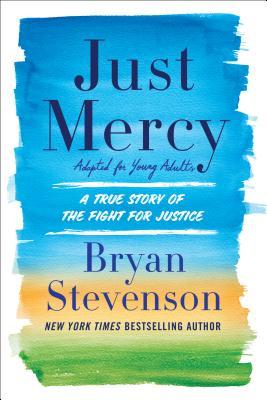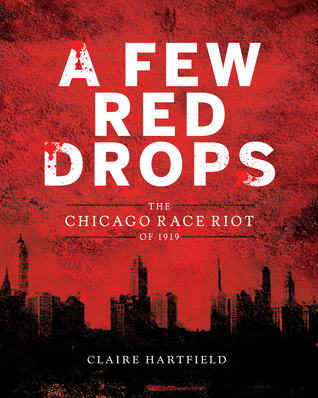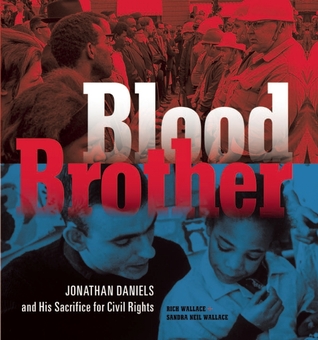“Racism separates, but it never liberates. Hatred generates fear, and fear once given a foothold; binds, consumes and imprisons. Nothing is gained from prejudice. No one benefits from racism.”
― Thurgood Marshall
Books About Social Justice

Just mercy : adapted for young people : a true story of the fight for justice Bryan Stevenson
The young adult adaptation of the acclaimed, #1 New York Times bestseller Just Mercy –soon to be a major motion picture starring Michael B. Jordan, Jaime Foxx, and Brie Larson and now the subject of an HBO documentary feature!
In this very personal work–adapted from the original #1 bestseller, which the New York Times calls “as compelling as To Kill a Mockingbird, and in some ways more so”–acclaimed lawyer and social justice advocate Bryan Stevenson offers a glimpse into the lives of the wrongfully imprisoned and his efforts to fight for their freedom.
Stevenson’s story is one of working to protect basic human rights for the most vulnerable people in American society–the poor, the wrongly convicted, and those whose lives have been marked by discrimination and marginalization. Through this adaptation, young people of today will find themselves called to action and compassion in the pursuit of justice.

Stolen Justice: The Struggle for African American Voting Rights (Scholastic Focus): The Struggle for African American Voting Rights Goldstone, Lawrence
A thrilling and incisive examination of the post-Reconstruction era struggle for and suppression of African American voting rights in the United States.
Following the Civil War, the Reconstruction era raised a new question to those in power in the US: Should African Americans, so many of them former slaves, be granted the right to vote?
In a bitter partisan fight over the legislature and Constitution, the answer eventually became yes, though only after two constitutional amendments, two Reconstruction Acts, two Civil Rights Acts, three Enforcement Acts, the impeachment of a president, and an army of occupation. Yet, even that was not enough to ensure that African American voices would be heard, or their lives protected. White supremacists loudly and intentionally prevented black Americans from voting — and they were willing to kill to do so.
In this vivid portrait of the systematic suppression of the African American vote, critically acclaimed author Lawrence Goldstone traces the injustices of the post-Reconstruction era through the eyes of incredible individuals, both heroic and barbaric, and examines the legal cases that made the Supreme Court a partner of white supremacists in the rise of Jim Crow. Though this is a story of America’s past, Goldstone brilliantly draws direct links to today’s creeping threats to suffrage in this important and, alas, timely book

A few red drops : the Chicago Race Riot of 1919 / Claire Hartfield
On a hot day in July 1919, three black youths went swimming in Lake Michigan, unintentionally floating close to the “white” beach. An angry white man began throwing stones at the boys, striking and killing one. Racial conflict on the beach erupted into days of urban violence that shook the city of Chicago to its foundations. This mesmerizing narrative draws on contemporary accounts as it traces the roots of the explosion that had been building for decades in race relations, politics, business, and clashes of culture. Archival photos and prints, source notes, bibliography, index

Accused! : the trials of the Scottsboro Boys : lies, prejudice, and the Fourteenth Amendment / Larry Dane Brimmer
This chilling and harrowing account tells the story of the Scottsboro Boys, nine African-American teenagers who, when riding the rails during the Great Depression, found their lives destroyed after two white women falsely accused them of rape. Award-winning author Larry Dane Brimner explains how it took more than eighty years for their wrongful convictions to be overturned.
In 1931, nine teenagers were arrested as they traveled on a train through Scottsboro, Alabama. The youngest was thirteen, and all had been hoping to find something better at the end of their journey. But they never arrived. Instead, two white women falsely accused them of rape. The effects were catastrophic for the young men, who came to be known as the Scottsboro Boys. Being accused of raping a white woman in the Jim Crow south almost certainly meant death, either by a lynch mob or the electric chair. The Scottsboro boys found themselves facing one prejudiced trial after another, in one of the worst miscarriages of justice in U.S. history. They also faced a racist legal system, all-white juries, and the death penalty. Noted Sibert Medalist Larry Dane Brimner uncovers how the Scottsboro Boys spent years in Alabama’s prison system, enduring inhumane conditions and torture. The extensive back matter includes an author’s note, bibliography, index, and further resources and source notes.

Blood brother : Jonathan Daniels and his sacrifice for civil rights / Rich Wallace + Sandra Neil Wallace
A Booklist Editor’s Choice
A Parents’ Choice Gold Award
A Eureka! Nonfiction Children’s Book Award Honor Book
Jonathan Daniels, a white seminary student from New Hampshire, traveled to Selma, Alabama, in 1965 to help with voter registration of black residents. After the voting rights marches, he remained in Alabama, in the area known as “Bloody Lowndes,” an extremely dangerous area for white freedom fighters, to assist civil rights workers. Five months later, Jonathan Daniels was shot and killed while saving the life of Ruby Sales, a black teenager. Through Daniels’s poignant letters, papers, photographs, and taped interviews, authors Rich Wallace and Sandra Neil Wallace explore what led Daniels to the moment of his death, the trial of his murderer, and how these events helped reshape both the legal and political climate of Lowndes County and the nation.

Dark sky rising : Reconstruction and the dawn of Jim Crow / Henry Louis Gates, Jr. with Tonya Bolden
This is a story about America during and after Reconstruction, one of history’s most pivotal and misunderstood chapters. In a stirring account of emancipation, the struggle for citizenship and national reunion, and the advent of racial segregation, the renowned Harvard scholar delivers a book that is illuminating and timely. Real-life accounts drive the narrative, spanning the half century between the Civil War and Birth of a Nation. Here, you will come face-to-face with the people and events of Reconstruction’s noble democratic experiment, its tragic undermining, and the drawing of a new “color line” in the long Jim Crow era that followed. In introducing young readers to them, and to the resiliency of the African American people at times of progress and betrayal, Professor Gates shares a history that remains vitally relevant today.

Pushout : the criminalization of Black girls in schools / Monique W. Morris
Fifteen-year-old Diamond stopped going to school the day she was expelled for lashing out at peers who constantly harassed and teased her for something everyone on the staff had missed: she was being trafficked for sex. After months on the run, she was arrested and sent to a detention center for violating a court order to attend school.
Just 16 percent of female students in the USA, Black girls make up more than one-third of all girls with a school-related arrest. The first book to tell these untold stories, Pushout exposes a world of confined potential and supports the growing movement to address the policies, practices, and cultural illiteracy that push countless students out of school and into unhealthy, unstable, and often unsafe futures.
For four years Monique W. Morris, author of Black Stats, chronicled the experiences of black girls across America whose intricate lives are misunderstood, highly judged—by teachers, administrators, and the justice system—and degraded by the very institutions charged with helping them flourish. Morris shows how, despite obstacles, stigmas, stereotypes, and despair, black girls still find ways to breathe remarkable dignity into their lives in classrooms, juvenile facilities, and beyond.

We are not yet equal : understanding our racial divide / Carol Anderson with Tonya Bolden
When America achieves milestones of progress toward full and equal black participation in democracy, the systemic response is a consistent racist backlash that rolls back those wins. We Are Not Yet Equal examines five of these moments: The end of the Civil War and Reconstruction was greeted with Jim Crow laws; the promise of new opportunities in the North during the Great Migration was limited when blacks were physically blocked from moving away from the South; the Supreme Court’s landmark 1954 Brown v. Board of Education decision was met with the shutting down of public schools throughout the South; the Civil Rights Act of 1964 and Voting Rights Act of 1965 led to laws that disenfranchised millions of African American voters and a War on Drugs that disproportionally targeted blacks; and the election of President Obama led to an outburst of violence including the death of black teen Michael Brown in Ferguson, Missouri as well as the election of Donald Trump.
This YA adaptation will be written in an approachable narrative style that provides teen readers with additional context to these historic moments, photographs and archival images, and additional backmatter and resources for teens





Leave a Reply